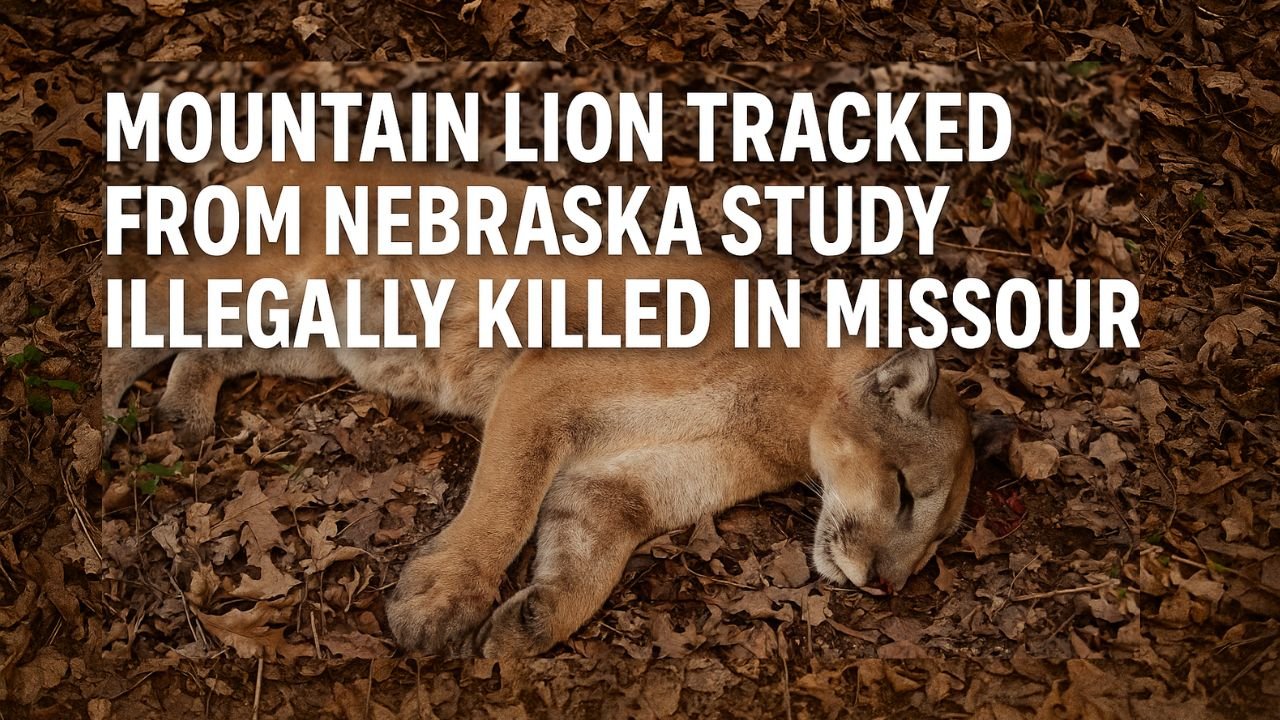A young mountain lion, first tagged by researchers in Nebraska in March 2023, was expected to play a key role in a long-term wildlife tracking study.
At just four weeks old, the male kitten had been located near the Niobrara Valley Preserve, with scientists hoping to monitor its life trajectory as part of the Nebraska Game and Parks Commission’s ongoing research into mountain lion behavior and movement.
But the study took a tragic and unexpected turn: a year and a half later, researchers learned the same mountain lion had been illegally shot and killed nearly 800 miles away in Iron County, Missouri.
Shooter Pleads Guilty After Social Media Revelations
The man responsible, Joseph Licklider, recently pleaded guilty to illegally killing the state-protected mountain lion.
According to the Missouri Department of Conservation (MDC), Licklider initially claimed he shot the animal while it was walking away from his deer hunting tree stand in November 2024.
However, an MDC investigation determined the killing was not justified, citing lack of threat, the lion’s protected status, and photos posted online by Licklider showing him and others posing with the animal after it was killed.
As part of his plea agreement, Licklider was ordered to:
- Pay a $2,000 fine
- Surrender his hunting rifle
- Lose his hunting privileges for one year
Nebraska Researchers Learn of the Killing
Sam Wilson, manager of Nebraska’s Furbearer and Carnivore Program, said researchers had lost track of the kitten after it was first tagged in 2023. Its mother had been fitted with a GPS collar for tracking purposes, which is how they initially located the kitten.
“We never saw that kitten again,” Wilson said. “The next time I got information about that cat was that it had been killed in Missouri.”
Mountain Lions Known for Long-Distance Travel
Wilson explained that long-distance movement is typical behavior, especially for young male mountain lions.
These animals often disperse from their birth areas in search of territory and potential mates. According to Wilson, the mountain lion in question was likely doing just that—but would have been unlikely to find a female anywhere east of Nebraska.
“They’ll never stop walking,” Wilson said. “The next mountain lion it would have run into would have been the Florida panther. I don’t know of any resident female populations between here and there.”
Such extensive travel isn’t unusual. In fact, other Nebraska-tagged mountain lions have made epic treks:
- One was recorded in Minneapolis, more than 650 miles away, in 2023.
- Another reached Montana, over 250 miles from Nebraska, before being legally hunted.
Despite their journeys, mountain lions from Nebraska are easy to identify due to the distinct ear-tagging system used by researchers.
A Loss for Science and Conservation
The death of the mountain lion represents a significant setback not just for Nebraska’s research program, but also for wildlife conservation efforts in the Midwest.
While mountain lions are more common in western U.S. states, their presence east of the Rockies remains rare and largely transient.
Without resident female populations in much of the Midwest, young males often roam vast distances without ever finding a mate.
The illegal killing of a tagged mountain lion in Missouri is more than just a violation of hunting laws—it is a stark reminder of the challenges faced by conservationists and wildlife navigating complex legal landscapes and fragmented ecosystems.
For researchers like Sam Wilson, who dedicate years to studying and protecting these elusive animals, the loss is deeply personal and symbolic.
With no established female mountain lion populations east of the Mississippi, the roaming young male’s death highlights how far these creatures must travel—and how far we have to go in terms of wildlife awareness and protection.




